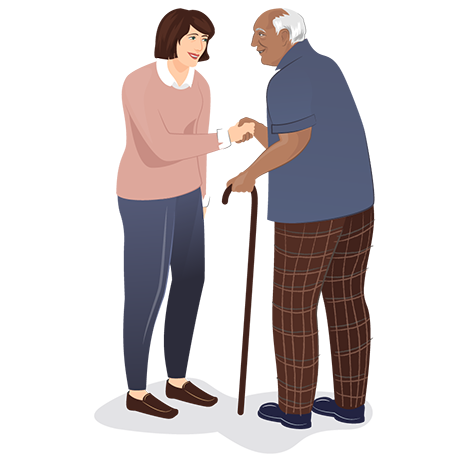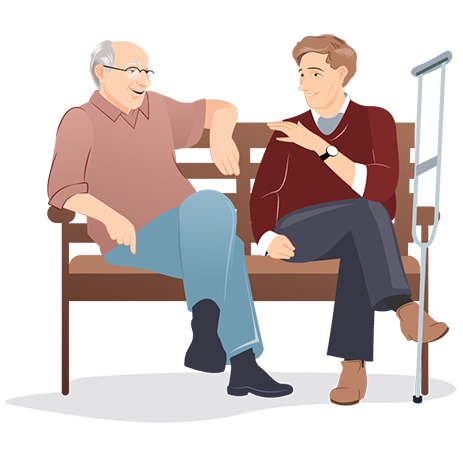
What are the types of dementia?
There are over 200 types of dementia, but the symptoms and early signs are similar and can be easy to spot. This guide will go over the more common types of dementia, their causes, and their symptoms so you can get specialist dementia care for your loved ones as early as possible.



Speak to one of our experts
Our friendly experts are here to help from 9am to 7pm, 7 days a week.
Dementia is increasingly common, affecting over 850,000 people in the UK and impacting up to one in 14 people over the age of 65. The word, dementia, is not the name of a disease, but actually a group of symptoms that describe progressive neurodegeneration, or ongoing decline in normal brain function. Services such as live in dementia care can be a vital resource to many families with loved ones suffering from dementia, especially as it can affect so much more than memory.
If you’re wondering if dementia live in home care could be an option for your loved one, read our live in care guide here or get in touch with our friendly team.
Common types of dementia
Diagnosing dementia is complicated, as different types of dementia can show very similar symptoms. There is no single test for diagnosing dementia. Diagnosis may require the work of doctors and neurologists in order to look into a patient’s medical history, conduct brain scans or perform cognitive assessments.
There are a number of early warning signs of dementia. They can include issues such as memory loss, personality changes, difficulty with communicating or disorientation. As the disease progresses, symptoms like poor spatial awareness, poor judgement, and issues with performing basic tasks will worsen. This can make diagnosis and dementia live in care even more important to ensure the comfort and safety of your loved ones.
We discuss some of the most common types of dementia below.
Alzheimer’s disease
Alzheimer’s disease is the most common dementia diagnosis in the UK, representing about two-thirds of cases in older people. Despite how common it is, there are big gaps in our knowledge about the disease. There are some factors that may contribute to a higher likelihood of developing Alzheimer’s, such as cardiovascular disease, family history, a severe head injury and ageing. Many people think that Alzheimer’s is the same as dementia, but in actual fact, it is a type of dementia.
Although rare, some people can develop Alzheimer’s at an early age. Alzheimer’s developed before the age of 65 is known as Young-onset Alzheimers, and it accounts for around five per cent of diagnosed cases.
Alzheimer’s disease speeds up the ageing process of the brain, and it gets progressively worse throughout the years. The areas of the brain that are most impacted are the ones associated with learning and memory, like the hippocampus. The frontal cortex can also be affected, resulting in altered behaviours and emotions.
Vascular dementia
Vascular dementia is another common condition, diagnosed in about 20% of people with dementia. This disease is related to the loss of blood flow in the brain due to damaged blood vessels and arteries. Lack of oxygen flow can result in damaged brain cells and produce symptoms such as a significant slowing of thought and difficulties with problem-solving.
There is evidence that living a healthier lifestyle, eating an appropriate diet, and quitting smoking can help postpone the further worsening of conditions.
Vascular dementia can also coexist with other changes to the brain that are linked to Alzheimer’s disease and dementia with Lewy bodies. This is a common occurrence and is known as mixed dementia.
Dementia with Lewy bodies
Dementia with Lewy bodies is a form of dementia caused by abnormal protein deposits in the brain, called Lewy bodies. Lewy body build-ups are also found in people with Parkinson’s disease and they affect the areas of the brain involved with muscle movement, visual perception, and thinking. This is why it’s common for Parkinson’s patients to eventually develop dementia symptoms, or Parkinson’s disease dementia, about 10 years after being diagnosed. Symptoms of dementia with Lewy bodies include hallucinations, confusion, slow movement, disturbed sleep, unsteadiness, fainting spells, and other symptoms close to the ones found in Alzheimer’s disease. There are some helpful treatments such as physiotherapy, medicines to help with the symptoms, or exercises and activities designed to work on cognitive function. However, those with Lewy body dementia will likely require live-in dementia care in order to live comfortably and safely.

Frontotemporal dementia
Frontotemporal Dementia is a less common form of dementia, however, it is seen as the third most common type of dementia in older people. It’s typically diagnosed between the ages of 45 and 65, which makes it often mistaken for young-onset Alzheimer’s disease. This form of dementia is caused by damage to the front and sides of the brain. There are two main variants of frontotemporal dementia: Behaviour variant frontotemporal dementia and primary progressive aphasia.
The behaviour variant is typically associated with major personality shifts occurring in people around their 50s and 60s. Brain cell damage is found in areas that control behaviour, empathy, judgement, and foresight. Primary progressive aphasia will mainly affect language skills like speaking, writing, and comprehension. This can manifest as hesitant speaking or as an inability to speak words in complete sentences.
Frontotemporal dementia can be diagnosed through the use of MRI, CT, or OET scans that identify what parts of the brain are damaged. Although there is no cure for this disease, those diagnosed can be helped through medication, occupational therapy, speech or language therapy, or dementia home care.
Rare types of dementia
The majority of people with dementia will be diagnosed with Alzheimer’s or mixed dementia with brain conditions stemming from vascular, Lewy body, or frontotemporal dementia. Aside from these, there are around 200 more kinds of dementia. These types are considered rare, but they still affect many of the population. The rarer kinds of dementia are thought to affect around 35,000 people and makeup around five per cent of all cases in the UK. Because of the rarity of these conditions, it is sometimes easy for them to go undiagnosed.
We discuss some of the rarer types of dementia below.
Huntington’s disease
An inherited condition, Huntington’s Disease is linked to a faulty gene that causes dementia through gradual damage to the brain and spinal cord. This form of dementia will typically start showing signs in people around the ages of 30 to 55. Problems with attention, problem-solving, thinking, personality changes, and mood swings may all be symptoms that signal Huntington’s disease. There are about 6,700 people in the UK diagnosed with Huntington’s disease, and although there is no cure, treatment and support for dementia live-in-home care can be extremely helpful. 
Progressive supranuclear palsy
This rare form of dementia affects around 4,000 people in the UK and is caused by an abnormal protein build-up. This protein build-up is similar to the one connected to Alzheimer’s disease. However, this condition will instead lead to problems with balance, walking, eye movement and swallowing. The symptoms are actually very similar to Parkinson’s disease, which can make it difficult to diagnose. It will get progressively worse, and although there is no cure, different kinds of therapy and the use of mobility and visual aids may be helpful.
Creutzfeldt -Jakob disease
Creutzfelft-Jakob disease appears to be caused by an abnormal infectious protein called a prion. This dementia is known to get worse and accelerate very fast. It’s more likely for this condition to develop spontaneously, sometime around the age of 60. However, it can also be inherited from a family member. Although extremely rare, a person can acquire Creutzfeldt-Jakob disease through contact with an abnormal prion protein. There is no cure for this disease and specialist dementia live in care may be required to make the diagnosed person as comfortable as possible.
Corticobasal syndrome
Corticobasal syndrome, also known as corticobasal degeneration, usually affects people aged between 50 and 70. The condition is associated with movement difficulties including tremors, muscle stiffness and balance problems. The most notable symptom of this disease is the inability to move one hand, a condition referred to as “alien hand”. This condition is caused by damage to the surface of the brain as well as to the deep part of the brain- the cortex and the basal ganglia. It is still unknown what causes this damage, although it is thought to be connected to proteins too.
Can you prevent dementia?
There is no known cure for the more common types of dementia, however, there are ways you can reduce your risk or slow the disease.
Dementia symptoms may be reversed if they develop from immune disorders or infections, thyroid problems, metabolic problems, nutritional deficiencies, or side effects from medication. If you or a loved one is experiencing these dementia-like conditions, it’s possible the cause of the symptoms can be reversed through treatment.
Factors that can help to combat dementia, reduce or slow down dementia
Diet and exercise
It is most important to receive a nutrient-rich diet and keep physically active as research has shown that there are greater risks for dementia in people who eat unhealthy diets and live sedentary lives.
Mental stimulation
Keeping the mind active with jigsaw puzzles, word games, reading, or playing a musical instrument can help with cognitive health, encourage connections in the brain to remain active, and help practise your motor skills.
Hearing properly
The use of hearing aids as an early treatment of hearing loss can greatly reduce the chance of dementia and cognitive decline.
Stopping smoking
Smoking can greatly increase your risk of dementia and make dementia symptoms worse. Quitting smoking will improve your overall health as well as help with any blood vessel conditions.
The Live in Care Company provides live in dementia care with tailored care plans to ensure that your loved ones are safe, in familiar surroundings, and completely supported. Call and speak to one of our friendly experts if you have any questions or concerns at 0118 449 2373 or request a callback.





